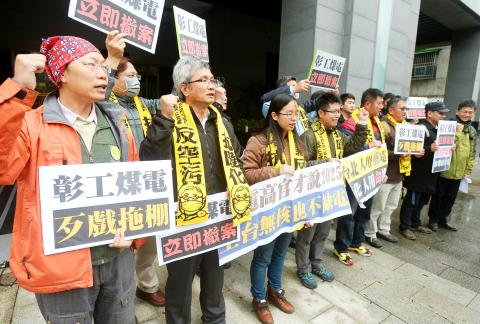Dozens of Changhua residents and activists yesterday rallied in front of the Environmental Protection Administration (EPA) in Taipei to protest a proposed coal-fired power plant, with no end to the 11-year-long battle over the project in sight.
The rally was timed to coincide with the EPA hosting the 15th environmental review of the project.
Taiwan Power Co’s (Taipower) proposal to build a two-generator plant on a 152 hectare property in the Changhua Coastal Industrial Park in Lugang Township (鹿港) was first submitted for an environmental assessment review in 2004. Between 2004 and 2007, the first round of reviews were held and the Environmental Impact Assessment (EIA) committee concluded that the project should be rejected.

However, before the EPA could formally adopt the committee’s decision, Taipower withdrew its submission to prevent a wholesale rejection.
The company resubmitted the project in 2008, almost unchanged from its original submission, and the project underwent another round of reviews up to August 2010, after which little was heard from Taipower about the proposal.
However, last month the company sent a collection of documents to the EPA to reopen the review process.
Changhua Environmental Protection Union director Tsai Chia-yang (蔡嘉揚) said that Taipower, in its 2004 proposal, said that Taiwan would face power shortages by 2011 without the Changhua plant, but the nation has survived so far without it, suggesting the company’s claims are inaccurate exaggerations.
Democratic Progressive Party Legislator Tien Chiu-chin (田秋堇) said the project should have been rejected years ago, but has somehow survived 15 environmental reviews.
“The plan [submitted today] is still based on data collected 10 years ago. The project is an insult to the intelligence of Taiwanese and an abuse of the EIA review system,” Tien said.
Attorney and environmental activist Thomas Chan (詹順貴), who was a member of the EIA committee that reviewed the project until 2007, said he resigned from the committee because the EPA allowed Taipower to withdraw the project before it could be formally rejected, thereby opening a loophole in the EIA system to enable unqualified projects to exit and re-enter the system.
“According to the Environmental Impact Assessment Act (環境影響評估法), no project can be resubmitted if it contains elements that have been rejected by an EIA committee. The latest Changhua plant proposal is apparently the same as the earlier versions, but the EPA has ignored this obvious fact and started another review. What is collusion, if this is not?” Chan said.
The EIA committee yesterday decided to return the project to the Ministry of Economic Affairs because it was resubmitted for more than a seven-year period and does not fit into the current environment.

ALIGNED THINKING: Taiwan and Japan have a mutual interest in trade, culture and engineering, and can work together for stability, Cho Jung-tai said Taiwan and Japan are two like-minded countries willing to work together to form a “safety barrier” in the Indo-Pacific region, Premier Cho Jung-tai (卓榮泰) yesterday said at the opening ceremony of the 35th Taiwan-Japan Modern Engineering and Technology Symposium in Taipei. Taiwan and Japan are close geographically and closer emotionally, he added. Citing the overflowing of a barrier lake in the Mataian River (馬太鞍溪) in September, Cho said the submersible water level sensors given by Japan during the disaster helped Taiwan monitor the lake’s water levels more accurately. Japan also provided a lot of vaccines early in the outbreak of the COVID-19 pandemic,

Kaohsiung Mayor Chen Chi-mai (陳其邁) on Monday announced light shows and themed traffic lights to welcome fans of South Korean pop group Twice to the port city. The group is to play Kaohsiung on Saturday as part of its “This Is For” world tour. It would be the group’s first performance in Taiwan since its debut 10 years ago. The all-female group consists of five South Koreans, three Japanese and Tainan’s Chou Tzu-yu (周子瑜), the first Taiwan-born and raised member of a South Korean girl group. To promote the group’s arrival, the city has been holding a series of events, including a pop-up

TEMPORAL/SPIRITUAL: Beijing’s claim that the next Buddhist leader must come from China is a heavy-handed political maneuver that will fall flat-faced, experts said China’s requirement that the Dalai Lama’s reincarnation to be born in China and approved by Beijing has drawn criticism, with experts at a forum in Taipei yesterday saying that if Beijing were to put forth its own Dalai Lama, the person would not be recognized by the Tibetan Buddhist community. The experts made a remarks at the two-day forum hosted by the Tibet Religious Foundation of His Holiness the Dalai Lama titled: “The Snow Land Forum: Finding Common Ground on Tibet.” China says it has the right to determine the Dalai Lama’s reincarnation, as it claims sovereignty over Tibet since ancient times,

Temperatures in some parts of Taiwan are expected to fall sharply to lows of 15°C later this week as seasonal northeasterly winds strengthen, the Central Weather Administration (CWA) said today. It is to be the strongest cold wave to affect northern Taiwan this autumn, while Chiayi County in the southwest and some parts of central Taiwan are likely to also see lower temperatures due to radiational cooling, which occurs under conditions of clear skies, light winds and dry weather, the CWA said. Across Taiwan, temperatures are to fall gradually this week, dropping to 15°C to 16°C in the early hours of Wednesday